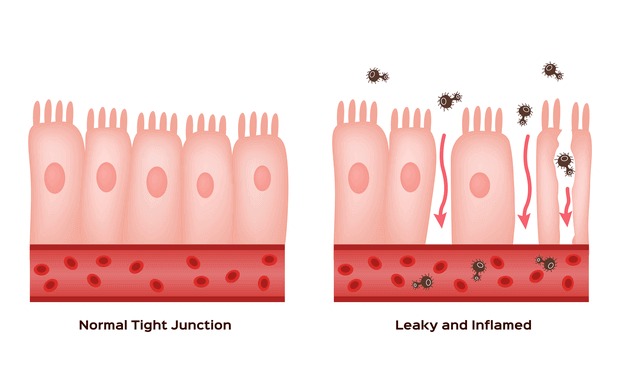Autoimmunity: Treating its root cause

What is Autoimmune disease?
The immune system normally guards against germs like bacteria and viruses, but with
autoimmune disease, the immune system attacks healthy cells – mistakenly attacking your body as a mode of defense.
The body is very good at having checks and balances in place – it has an innate wisdom and is always doing what is in your best interest. But when the body starts attacking itself, you know that something has gone wrong.
In other words, the body doesn’t know who its enemies are or what to attack. Autoimmunity can affect nearly every part of the body and has been linked to an extensive list of diseases, including rheumatoid arthritis (RA), Hashimoto’s thyroiditis (also known as chronic lymphocytic thyroiditis or Hashimoto’s disease), celiac disease (CD), Lupus and Irritable Bowel Disease (IBD).
Tackling autoimmune conditions
From a functional nutrition lens, rather than looking at the type of auto-immune disease, we focus on the underlying process that has led to imbalances and confusion in the body. A functional medicine approach to autoimmune disorders has the possibility of reversing the disease process by enabling your body to heal itself.

Stress is a major factor in autoimmune conditions
Through our decade of work, we’ve discovered that stress has consistently played a huge role in the onset of auto-immune conditions.

And we’re not just talking about emotional stress. Physiological stress; pain in the body, infections, lack of sleep, and eating the wrong things can often trigger an auto-immune response. The other aspect we work on is the gut – with auto-immune conditions, there is almost always a gut-related issue.
Who is more likely to suffer from autoimmune conditions?
While we know that studies show that women are more susceptible to autoimmune conditions, there hasn’t been enough evidence to pinpoint why. In fact, women are typically 60% more likely to be diagnosed with an autoimmune condition than men.

What we know is that inflammation goes hand in hand with autoimmune disease, and that oxidative stress shouldn’t be underestimated.
Autoimmune disorders can occur at any age and at unexpected times in a person’s life. They can also affect all organs of your body including your brain and nervous system.
Common types of Autoimmune conditions:
Rheumatoid Arthritis
Rheumatoid arthritis is a chronic, autoimmune disease that affects the joints. It is different from other types of arthritis because it causes inflammation in the joints and can lead to tissue damage and permanent joint deformity.
Symptoms of rheumatoid arthritis include:
- Pain and stiffness of the joints (especially those in your fingers, wrists, knees, ankles, and feet).
- You may also experience fatigue or morning stiffness that eases as you move around throughout the day.
It’s believed that gut bacteria play an important role in triggering this autoimmune condition: when we eat something containing gluten grains like wheat products they create an inflammatory response inside our gut which may then travel up into our bloodstream causing widespread organ damage throughout our body including
the brain where it affects moods and sleep patterns.
Hashimoto’s autoimmune thyroiditis
Hashimoto’s Autoimmune Thyroiditis (HAIT) is an autoimmune disease that causes the body to attack its own thyroid gland, resulting in underactive or overactive thyroid function.
Hashimoto’s is the most common cause of hypothyroidism. It is particularly common among women, young adults and people with other autoimmune disorders like rheumatoid arthritis and lupus.
Celiac Disease
Celiac disease is an autoimmune condition that affects the small intestine, which is where food is broken down and nutrients are absorbed.
When someone with celiac disease eats foods containing gluten, their immune system attacks the villi (tiny fingerlike projections) in the small intestine. This leads to damage and inflammation that can cause a variety of symptoms including fatigue and joint pain. In its most severe form, celiac disease can lead to intestinal cancer or anemia.
Treatment for celiac disorder involves following a strict gluten-free diet for life. Since gluten-containing foods are found in many processed products (including condiments), it’s important to read ingredient labels carefully when shopping at grocery stores or dining out at restaurants so you know what you’re eating.
If you suspect that you may have this condition, consult a health practitioner before making any changes to your lifestyle since they can help ensure that your new diet will be nutritionally balanced while also preventing any unpleasant side effects from occurring as a result of suddenly eliminating entire food groups.
Lupus
Lupus is a condition that affects the body’s tissues and organs. It can cause inflammation in various areas of your body, including your skin, kidneys, heart, lungs, blood cells (including platelets), brain and joints.
Lupus is a lifelong condition but symptoms can be managed with food and lifestyle changes.
Irritable Bowel Disease (IBD)
Irritable Bowel Disease (IBD) is a group of chronic, relapsing inflammatory diseases of the gastrointestinal tract. IBD includes two common conditions: ulcerative colitis and Crohn’s disease.
IBD symptoms may include abdominal pain and cramping, diarrhea and/or constipation, rectal bleeding and urgent need to move bowels. The severity of these symptoms vary from person to person — some people experience mild symptoms while others require hospitalization for severe complications such as inflammation in other organs like the eyes or joints.
Read our member’s journey with IBD here.
Chron’s Disease
Chron’s disease usually occurs in your intestines but can affect any part of the digestive tract and other organs, such as the liver, pancreas ,and joints.
The cause of Chron’s is unknown, but it’s believed that a combination of environmental factors may trigger the immune system to attack healthy tissue in your intestines.
For example, if you have an infection or take long-term antibiotics, this may damage your gut bacteria (the “good” bugs) so that they cause inflammation when they normally don’t behave like this. In fact, some recent studies have shown that probiotic supplements can help treat or prevent Chron’s disease by replenishing these good bacteria in your gut.
Read our member’s journey with Chron’s disease here.
Psoriasis
Psoriasis is an autoimmune condition that affects the skin, joints, and other organs.
It can cause patches of red, scaly skin that are often itchy and may bleed when scratched. The affected areas can be small or cover large areas of your body. They can vary in size from tiny spots to plaques up to 5cm across (2 inches).
Psoriasis doesn’t usually cause serious health problems, but sometimes it can be painful or uncomfortable for you and others around you. It also increases your risk of developing other inflammatory conditions such as heart disease and type 2 diabetes, so it’s important to manage this condition effectively.
Autoimmunity and food sensitivities
It’s important to realize that food sensitivities are different from food allergies. A food allergy occurs when the body’s immune system mistakenly identifies a certain food protein as harmful and begins producing antibodies against it. This can lead to symptoms such as itching, swelling, hives, or even anaphylaxis (a severe allergic reaction).
Food sensitivities on the other hand may be caused by inherited genes that make your intestines more permeable (leaky gut), causing undigested foods to leak into your bloodstream and cause inflammation throughout your body. This means that leaky gut syndrome may not produce symptoms until later on in life when there is enough accumulated damage.

Food sensitivities will also vary depending on which autoimmune disease you have been diagnosed with—for example some people are sensitive only to gluten while others might experience cross-reactions with dairy products due to similar proteins found in both foods.
Want to learn more about the food sensitivity test we run at The Nutrition Clinic? Read more here.
You don’t have to do this alone.
A Functional Nutritionist can help with diet and lifestyle changes, supplements, food sensitivities, detoxification and inflammation, and gut healing.
Interested to know how we can help you personalize your nutrition and help you manage your autoimmune condition? Schedule a call with our care manager or viewer Schedule a free 10-minute call with our care manager or learn more here.
We look into your family and personal health history, indicators of physiological stress, your sleep, your gut microbiome, nutritional deficiencies, neurotransmitter indicators and other biomarkers, to make sure that we not only get to the root of your symptoms, but help you optimise your health so that you can start feeling your healthiest.
💡Ready to take your health to the next level? Book your first consultation here.